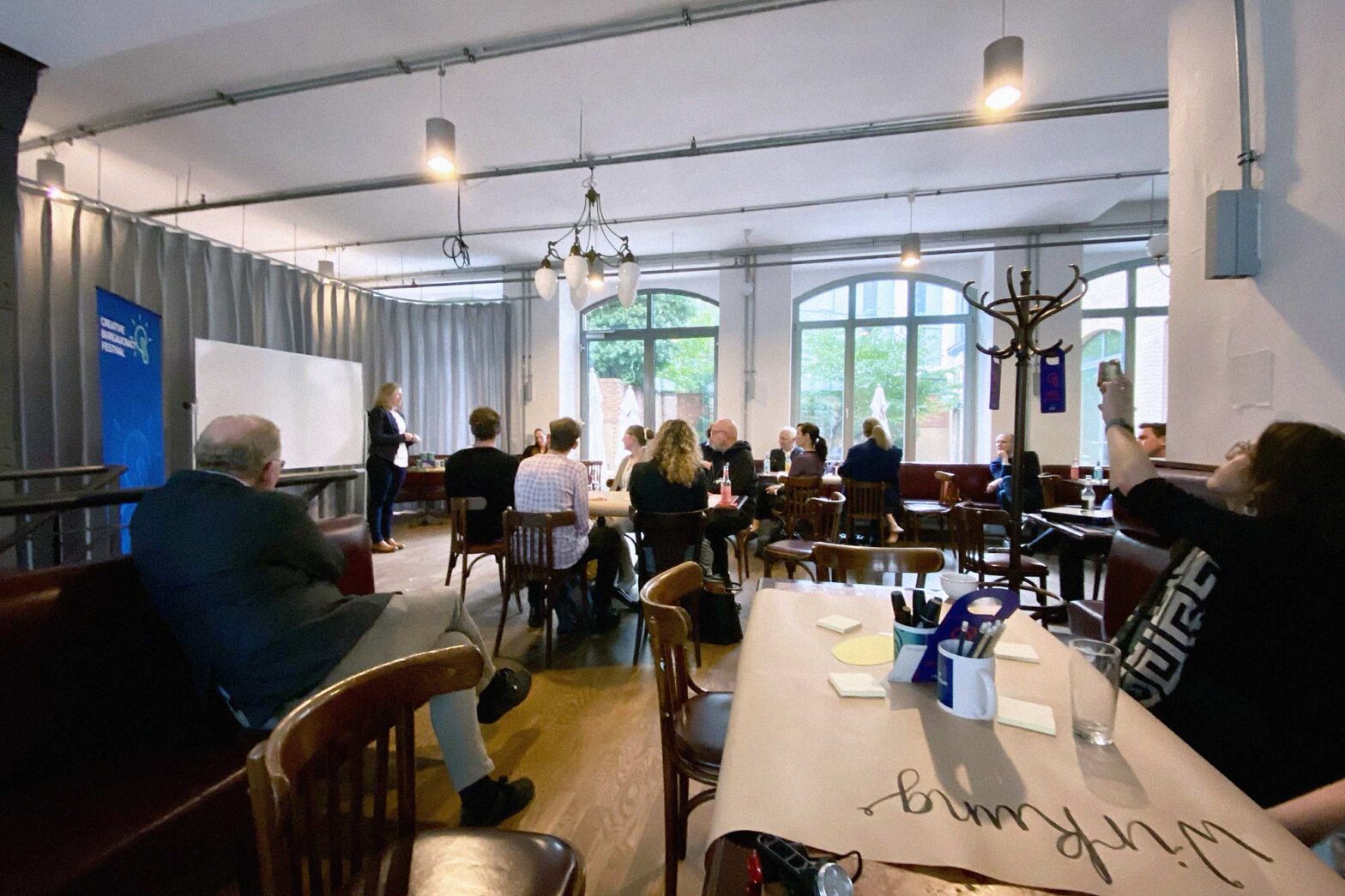This week felt packed again – with over 50 scheduled meetings in 5 days. That meant many context switches. Despite that, I still decided to attend a community space workshop of the Creative Bureaucracy Festival folks on Thursday evening. Cause community is what keeps us going. That’s at least what we keep saying, and I believe.
I participated in Creative Bureaucracy Festival only in 2019 and 2023, missing 4 editions. The term festival seems justified with engaging and fun formats and an explicitly broad appeal to national and international participants.
So, for 2.5 hours, we reviewed what should be kept, added, cut, and what should be nurtured – as the event is one of a kind, especially when directly compared to other public sector events. In moving setups, we reviewed and ideated how to increase the festival’s impact, strengthen its links to other entities and communities, add further creative interventions, and consider topical focal points.
With local and federal government people in the room, in-house public sector consultants and folks from academia, the breadth of the conversations was good. Towards the end, I got drawn into a discussion around user involvement, research and usability testing. I ended up pledging to support a government forms testing format. We are still determining what that will be about. We have 8 months to figure that out. By then, we should have various user researchers at DigitialService, and it could become a powerful demo of our user-centred design practice.
Working more closely with justice teams
Throughout the week, I spent a good chunk of time with the digital court claims team. Continuing from the peek-into-the-workshop session last Friday, I attended a strategic planning session with members of the Federal Ministry of Justice on Tuesday.
The team has created an eligibility checker and is building a semi-generic claims service at the moment. We ran a team workshop on the work’s future direction and scope. The larger service work is referenced in the Federal government’s digital strategy presented 14 months ago. Multiple entities are developing building blocks related to digital courtrooms. In the coming months, it will be vital to bring these entities into the same room to understand how all transactions, tools, and pieces of information come together and create a holistic service experience for users across locations and integrate various entities.
The work we do is essential to reshape how people experience digital justice and will require a broad and bridge-building approach. I am looking forward to spending more time with the designers and product managers in the area, building the awareness, vision and communication around it.
Talking about good services and standards
On Thursday, the NExT network ran its 7th bar camp. These take place remotely twice a year – in spring and autumn. I joined a little later in the morning and saw some 60 people on the virtual planning board. Framed with some keynotes, 11 sessions in 2 rounds discussed all things digital transformation. Topics ranged from agile practices, digital communication, low code platforms, data-driven work and user experience standards.
My colleague Caro and I pitched a 45-minute slot on good services and standards. Our pitch said this:
How do you build good digital services?
The Service Standard is the most unknown and underestimated artefact for digital government transformation: we report on its practical application in 3 Federal Ministries – Finance, the Interior and Justice – and how radical transparency can improve practices for all.
At the time of our session, some people had left the remote camp already. With competition from 5 other parallel sessions, we still attracted around 30% of the remaining participants.
Kicking things off, we asked about the characteristics of good services. Luckily, people named the expected things:
- effectively and efficiently reaching its goal
- communicating in clear language
- straightforward in use – for everyone
- connected to case working systems
- improvement to previous versions
- easy to use
- quick turnaround
- gets improved continuously
- multidisciplinary teams worked on it
- service works
- has a unified foundation
- users/citizens were involved and tested the service
Caro and I gave an input, introducing the standard, showing how we are using it and sharing how we have created peer reviews for the legal aid service. Less surprisingly, some people had never heard about the Service Standard. So if the bar camp session helped introduce people to it, it has been a success.
In the coming weeks, I am planning to do another talk on the Service Standard at NExT. And Caro and I also got a talk at the Berlin-based Smart Country Convention coming up in early November. So, we won’t stop talking about the Service Standard and its application at Digital Service anytime soon.
What’s next
This week, I interviewed 4 design candidates. I will continue next week with up for 3 more interviews. People demonstrated good range of skills and experience, and the interviewees were diverse in background, education, nationality and ethnicity too.
On Thursday, we will run an all-day delivery offsite. Everyone from our delivery disciplines is invited – agile coaches, designers, engineers, product and transformation managers, and user researchers. It will be part un-conference, part show and tell, part co-creation workshop with plenty of time for mingling and getting to know each other. Mid-week, I created some colourful minimal branding for the day so that participants could add another sticker to their laptops.

On Friday, I might also join a session of the advisory council for the Federal government’s digital strategy. Some of our justice projects are considered lighthouse projects, so they must report progress.

